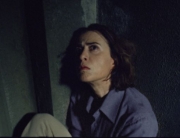This thoughtful thriller takes a fresh look, through a girl’s eyes, at a mystery usually treated in a more lurid style: how notorious Nazi war criminals successfully hid in plain sight for decades near the bottom of the globe in Argentina.
It opens in 1960 in Patagonia, where the distance from the rest of the world seems great when parents pack up their three children to drive the long highway to the mother’s childhood home. Eva (Natalia Oreiro) talks to her 12-year-old daughter Lilith (Florencia Bado), along with her younger sister and older brother, in German. The snow-capped mountains they head for seem like the Bavarian Alps when they arrive at the quaint old lakefront chalet deep in the woods where Eva grew up, which she and her husband intend to turn back into a resort hotel.
At the German school in the nearby town of Bariloche, Eva’s former classmates and teachers remember her when she enrolls her children. The school—inspired by the town’s real Colegio Aleman, whose director wasn’t outed as a wanted Nazi war criminal until 1994—has an archive that includes photos of the annual Hitler’s birthday commemorations and books decorated with swastikas secretly buried. This is the kind of comfortable German community where the telephone book has a listing for “José Mengele.”
A visitor (Alex Brendemühl) negotiates to stay at the family’s inn, even though it will still be some weeks until it’s ready to open for the public. He’s a doctor conducting genetics research at the nearby veterinary facility to improve cattle—the place to where aquaplanes come and go on the lake. He works with a knife engraved “Blood and Honor,” and keeps detailed journals of how to improve the race.
But like writer/director Lucía Puenzo did in her earlier films, XXY (2007) and The Fish Child (2009), she looks at the world through a just-turning adolescent girl who is bullied and teased for being different. (Puenzo’s novel will available in English next month.) Here, Lilith is petite, and the doctor picks up on her insecurities and offers experimental growth hormone injection treatments. (I was uneasily reminded of the aggressive doctor who pressed to have my short son similarly treated, who then shortly after took a top position at the pharmaceutical company producing the drug.)
The (non-German) father, Enzo (Diego Peretti), is deeply suspicious, so the affable doctor finds a way to insinuate himself with Enzo by appealing to his self-interest, which is more uncomfortably insidious than the macabre violence in the similarly themed The Boys from Brazil. While the father handcrafts and repairs unique dolls, the doctor connects him to a factory that can mass-produce identical designs of the dolls through molds. (The symbolism gets a bit heavy-handed, on top of the Biblical women’s names, and the cinematography by Nicolás Puenzo, the director’s brother, that favors close-ups of spiders and webs.)
Headlines in the local paper warn that Israeli agents are searching the area for Mengele since capturing Eichmann, while undercover librarian Nora Eldoc (Elena Roger) rummages through the school records, hangs around the Bavarian Bar, and calls the Mossad with tips. (Puenzo claims in interviews that Mengele’s crimes weren’t then widely known, but, as their intentions were described in Robert Jay Lifton: Nazi Doctors (2009), the Nuremberg Doctors Trials were completed before 1950.)
The doctor is pressed by compatriots to reluctantly leave his experiment, even when Lilith starts developing serious side effects and he doubles the doses. The side effects for Argentina were more serious, though, as Kevin Macdonald’s My Enemy’s Enemy (2007) exposed how the Nazis welcomed by the Peronists advised the military government on Gestapo interrogation techniques. In the guise of a suspenseful thriller, Puenzo raises disturbing questions about her country’s complicity in fostering fascists.
















Leave A Comment